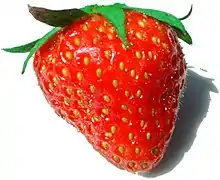fraise
English
Etymology 1
From Middle English fraisen, from Old English frāsian (“to ask, try, tempt”), from Proto-Germanic *fraisōną (“to attempt, try”), from Proto-Indo-European *per- (“to attempt, try; risk, peril”). Cognate with West Frisian freezje (“to fear”), Dutch vrezen (“to fear, dread, be afraid”), German freisen (“to put at risk, endanger, terrify”).
Verb
fraise (third-person singular simple present fraises, present participle fraising, simple past and past participle fraised)
Related terms
Etymology 2
Borrowed from French fraise (“ruff”), fraiser; compare French friser (“curl”), perhaps from Provençal frezar; ultimately from Germanic).
Noun
fraise (plural fraises)
- A type of palisade placed for defence around a berm; a defence consisting of pointed stakes driven into the ramparts in a horizontal or inclined position.
- (historical) A ruff worn (especially by women) in the 16th century.
- (historical) An embroidered scarf with its ends crossed over the chest and pinned, worn (especially by women) in the 19th century.
- A fluted reamer for enlarging holes in stone; a small milling cutter.
- A tool for cutting the teeth of a timepiece's wheel to correct inaccuracies.
Verb
fraise (third-person singular simple present fraises, present participle fraising, simple past and past participle fraised)
- (military) To protect, as a line of troops, against an onset of cavalry, by opposing bayonets raised obliquely forward.
- (Can we find and add a quotation of Wilhelm to this entry?)
Etymology 3
See froise.
Noun
fraise (plural fraises)
Noun
fraise (plural fraises)
- (Gallicism, chiefly cooking, rare) A strawberry.
- 1978 January 27, New York Magazine, volume 11, number 9, page 62:
- The big-deal dessert is fraises Romanoff, ripe strawberries in liquored whipped cream.
- 2015, Howard Belton, A History of the World in Five Menus,
- The Emperor also gave the family three fraises, or stalked strawberries, for their coat of arms.
- 1978 January 27, New York Magazine, volume 11, number 9, page 62:
References
- Chambers's Twentieth Century Dictionary (1908).
External links
- fraise in Webster’s Revised Unabridged Dictionary, G. & C. Merriam, 1913.
French

Pronunciation
- IPA(key): /fʁɛz/
audio (file)
Noun
fraise f (plural fraises)
- strawberry
- bulwark, palisade (defensive rampart of earth with sharpened wooden stakes set in at an angle)
- (literary) nipple
- 1797, Marquis de Sade, Juliette, I:
- Les doigts de notre charmante supérieure chatouillaient les fraises de mon sein, et sa langue frétillait dans ma bouche.
- 2001, Dominique Leroy, Hic et Hec, p. 53:
- un corset négligemment noué par une échelle de rubans gris de lin renfermait à demi la neige élastique de son sein, son mouchoir transparent, dérangé par les mouvements de la nuit, laissait voir une fraise vermeille [...].
- 1797, Marquis de Sade, Juliette, I:
Derived terms
- aller aux fraises
- fraise des bois
- fraise des Indes
- fraisier
- fraisiériste
- ramener sa fraises
Descendants
- Khmer: ហ្វ្រែហ្ស៍ (frɛɛh)
Etymology 2
Related to fraiser, or possibly from a Vulgar Latin *fresāre, from Latin fresum, past participle of frendō, or from a derived root *fresa. Compare Italian and Spanish fresa.
Etymology 3
From fraiser.
Verb
fraise
- inflection of fraiser:
- first-person and third-person singular present indicative and present subjunctive
- second-person singular imperative
Further reading
- “fraise” in le Trésor de la langue française informatisé (The Digitized Treasury of the French Language).